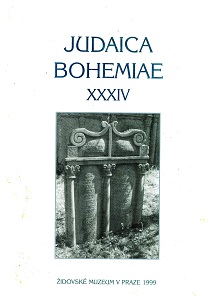The Tumult of Mladá Boleslav (Jungbunzlau, Bumsla) in the Messianic Year 5426/1666
The Tumult of Mladá Boleslav (Jungbunzlau, Bumsla) in the Messianic Year 5426/1666
Author(s): Alexandr PutíkSubject(s): Social Sciences, Economy, Jewish studies, Micro-Economics, Economic history, History of Judaism
Published by: Židovské Muzeum v Praze
Keywords: confessional antagonism; economic competition; Jewish settlement; discriminatory measure; imperial privilege; anti-Jewish violence;
Summary/Abstract: The Mladá Boleslav tumult of 1666 was the composite result of several long-term causes and coinciding circumstances. Its primary cause was confessional antagonism fuelled by economic competition (strained relations caused by opposing economic interests were a current feature of contemporary towns). In Mladá Boleslav, this animosity was enhanced by spatial considerations: the growth of the Jewish settlement in the immediate surroundings of the deanery and the town’s main church. The conflicts stemming from the close neighbourhoods of both groups were to be resolved by a pri vilege bestowed upon Mladá Boleslav by the Emperor Leopold I in 1660; this privilege discriminated against the Jews. The imperial document prohibiting the Jews from leaving their houses during Christian church services played a key role in the future conflict. In the years 1660-1665, the Jews respected the curfew even for the price of can celling their synagogue services. In 1666, in an atmosphere of anticipation of the coming of the Messiah, some Jews did not submit to the discriminatory measure on Easter Saturday (April 24) and in spite of a warning went to their synagogue. (This was their only real “guilt”, the later accusation of deliberate disturbance of Christian services was false). The outburst of the tumult was the result of a fatal encounter of two people: Dean Jan Edmund Havlík and the Jewish first elder Ziskind Šťastný Bumsla. The immediate stimulus starting the further course of event was J. E. Havlík’s vulgar swearing at the Jews which the first elder Ziskind countered by his threat to complain to higher places. The dean answered by an impulsive action: a physical attack on the first elder. The Jews (mostly members of the body of elders) who witnessed the scene were unable to cope with the strain of the situation and charged at the dean. In a brief scuffle that followed, the dean’s clothing suffered some damage. Any bodily harm was negligible. J. Havlík was freed by Rabbi David ben Samuel Tachovský (Heller-Takha), who then made an unsuccessful attempt to calm the offended cleric. The ensuing tumult was provoked by Havlík’s ostentatious display of pain and his unblushing calls for revenge. (It is impossible to decide with absolute certainty how much of the dean’s indignation could be ascribed to a spontaneous reaction and how much was calculated.) The violence began with a stone hurled at the rabbi and quickly developed into a stone-throwing battle; on both the Jewish and Christian side participated mainly boys and young men. Other age groups gradually joined in. The result and character of the fight changed with the arrival of lower-class reinforcements. In the first phase, the Jews were able to hold the east end of Jewish Street; during the second phase, they withdrew to School Lane. Finally, under increasing pressure, the remaining defenders were forced to retreat to the synagogue. The third phase of the “combat” was characterized by a direct attack on the synagogue, breaking windows and the looting of Jewish homes. The tumult was stopped by an intervention of the town council and the imperial magistrate. They managed to prevent further destructive actions just by verbal persuasion and threats. The tumult resulted in several injuries and, above all, considerable material damage. The tumult was followed two parallel administrative actions: one was conducted by secular authorities, the other by the Church. The ecclesiastical action was carried out by the Archiépiscopal Consistory (basically an investigation following a complaint of the Jewish elders that the dean started the tumult); it reached its decision already on May 7 by an unambiguous decision in favour of the dean. The secular inquiry (investigation and arbitration of the conflict between the Christian and Jewish inhabitants of Mladá Boleslav) lasted much longer and came to a more balanced conclusion. The decisive role pertained to the Bohemian Vice-Regency which acted in concert with other offices. The field investigation was conducted by the two district chiefs for the region of Mladá Boleslav. In its decision of June 17,1666 (tantamount to a court verdict), the Vice-Regency found the Jewish elders guilty of breaking the imperial privilege and imposed a fine on them. At the same time, it ordered an investigation against the perpetrators of anti-Jewish violence, restitution of stolen property and compensation for damages. Again, the district chiefs were ordered to implement the decision of the Vice-Regency. Whereas the Jews were forced to pay all instalments of a fine of one hundred threescore Meissen groschen, the restitution and compensation brought only moderate results. All Jews who took part in the brawl had to apologize to the dean who forgave them. Ziskind Šťastný Bumsla was stripped of the office of first elder and received a full pardon only after several years. The tumult of Mladá Boleslav did not become as fatal as other incidents of the same name. The initial skirmish developed into acts of vandalism and looting. Luckily, no human lives were lost; the tumult only resulted in injuries. The incident did not reach the intensity of a “genuine” lethal pogrom due to several factors. The hostile crowd - though guilty of destruction, robbery, and bullying the Jews - stopped short of murder. The representatives of the local government - though guilty of lying like small schoolboys and shielding the offenders - fulfilled their duty in the decisive moment. The Jewish defenders - though unable to hold their streets against the growing numbers of attackers - managed to halt the offensive to minimize the period of “unchecked” destruction until the official intervention.
Journal: Judaica Bohemiae
- Issue Year: XXXIV/1998
- Issue No: 1
- Page Range: 4-106
- Page Count: 103
- Language: English
- Content File-PDF

